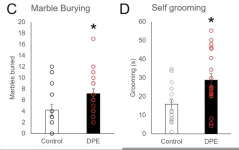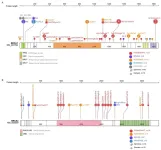(Press-News.org) A new study from The University of Toledo suggests early exposure to a common class of insecticides called pyrethroids may increase the risk of autism and other developmental disorders, even at levels currently recognized as safe by federal regulators.
The findings, which come from a study of mice, were published today in the peer-reviewed journal PNAS Nexus.
Pyrethroids are some of the most widely used insecticides in the country, appearing in both consumer products and industrial preparations.
“If you have someone who comes and sprays in your house, this is likely what they’re spraying. It’s used in landscaping, it’s what they fog in the streets for mosquitos. It’s everywhere,” said Dr. James Burkett, an assistant professor of neuroscience in the UToledo College of Medicine and Life Sciences and the paper’s corresponding author. “Our study, however, adds to the evidence that these chemicals might not be as safe for children and pregnant women as we once believed.”
Interest in a possible link between autism and pyrethroids has grown after several epidemiological studies documented higher rates of neurodevelopmental disorders in areas where the pesticides were used.
The new UToledo-led research sought to build on those population-based studies by analyzing the specific behavioral changes attributable to low-level exposure to pyrethroids.
Working with a team that included scientists from Columbia, Emory, and the University of Southern California, Burkett examined the offspring of female mice who were exposed to small doses of the pyrethroid insecticide deltamethrin before, during and immediately after pregnancy.
The researchers found those mice exhibited increased hyperactivity and repetitive behaviors, less vocalization, and were more likely to fail basic learning tests compared to controls.
The young mice also experienced disruptions in their dopamine system.
“These are all similar to symptoms human patients with neurodevelopmental disorders might have,” Burkett said. “We are not saying these mice have autism or that they have ADHD. That’s not the goal here. What we are saying is that something in their brain has been altered by this exposure and it’s resulting in the same kinds of behaviors that we see in children with autism.”
Dr. Gary Miller, vice dean for research strategy and innovation at Columbia University Mailman School of Public Health and a co-author on the study, said the research builds on prior efforts to identify other potentially harmful pest control chemicals.
“We have reduced our exposures to many classes of dangerous pesticides over the past few decades through restrictions and regulations.” Miller said. “This study adds to a growing body of literature that the widely used pyrethroids are not without adverse effects and should be further evaluated for their safety.”
The prevalence of autism in the United States has risen significantly over the past two decades, rising from one in 150 children in 2000 to one in 44 children in 2018, according to the Centers for Disease Control and Prevention.
Some of that increase is being driven by more awareness of autism spectrum disorder and better diagnostic processes. However, scientists still don’t know what causes most cases of autism.
“Research has traditionally focused on genetics, but it’s come to be appreciated there’s also a significant environmental element,” Burkett said. “Unfortunately, those factors are very poorly understood. That’s why this kind of research is so important. You can’t change someone’s genetics, but you can address environment factors.”
Pyrethroids are not the only class of pesticides that have been linked to autism, and scientists generally agree that development of the condition requires more than one single trigger.
“This research represents a piece of the puzzle. It is not definitive proof that the pesticide is unsafe or directly causing autism in humans,” Burkett said. “It may, however, suggest that the safe level of the pesticide needs to be revisited for pregnant women and children.”
END
Research links common insecticide to neurodevelopmental disorders
A UToledo-led study has found early exposure to a common class of insecticides called pyrethroids may increase the risk of autism and other developmental disorders, even at levels currently recognized as safe by federal regulators.
2023-04-25
ELSE PRESS RELEASES FROM THIS DATE:
New research sheds light on how to choose quality eHealth tools
2023-04-25
With so many eHealth tools available, it can be challenging to select the best one for a specific health need. A recent study published in JMIR Human Factors provides valuable insights on how to choose quality eHealth tools in an evolving landscape of digital health technology. This study titled “Assessing the Quality and Impact of eHealth Tools: Systematic Literature Review and Narrative Synthesis” comprehensively examined how the quality and impact of eHealth tools are currently assessed.
Led by Dr Christine Jacob, a health tech researcher at the University of Applied Sciences and Arts Northwestern ...
SwRI tests automated vehicles in virtual off-road environments
2023-04-25
SAN ANTONIO – April 25, 2023 – Southwest Research Institute (SwRI) has created a 3D simulation tool to test automated vehicles in virtual off-road environments modeled after real-world conditions. The research expands SwRI’s investment into software-in-the-loop solutions to test connected and automated vehicles (CAVs) in scenarios ranging from congested roadways to off-road terrain. A simulated environment, or a 3D “software loop,” supports evaluations of an infinite number of scenarios that would be cost-prohibitive to test in the real world.
The technology meets U.S. Department of Defense demands ...
Pesticides and neurodevelopment disorders
2023-04-25
A study of 72 mice mothers and their litters suggests a popular pesticide may cause neurodevelopmental disorders in humans. Previous studies have shown that nearly half of the risk for neurodevelopment disorders, including autism, is environmental, but few specific environmental causes have been clearly identified. James Burkett and colleagues exposed mice to low doses of pyrethroid pesticide deltamethrin during pregnancy and lactation. Pups of exposed mothers vocalized less compared to pups of unexposed mothers. ...
HRD detection predicts sensitivity to platinum-based chemotherapy for ovarian cancer patients in China - BGI Insight
2023-04-25
Homologous Recombination Deficiency (HRD) is a biomarker that predicts ovarian cancer treatment with PARP inhibitors or breast cancer treatment with first-line platinum-based chemotherapy. However, limited research is documented on platinum-based treatment prediction with HRD as a biomarker in ovarian cancer patients, especially in the Chinese population.
This first-ever China prospective cohort study, jointly conducted by BGI Genomics clinical researcher Dr. Shao Di and the Fudan University Shanghai Cancer Center team and published on the Journal of Ovarian ...
NIAID appoints Ted Pierson as new Vaccine Research Center director
2023-04-25
“Ted brings a wealth of knowledge and expertise in virology and human immune responses to viruses. He has played a key role in developing antiviral vaccines and furthering our understanding of important viruses transmitted by mosquitoes and ticks—arboviruses—and how neutralizing antibodies work against flaviviruses, such as Zika virus,” said Acting NIAID Director Hugh Auchincloss, M.D. “He is exceptionally well-suited to lead the VRC and its continued pursuit of innovative basic, translational and clinical discovery.”
Prior to his VRC appointment, Dr. Pierson served as a senior investigator and chief of NIAID’s Laboratory of ...
Ten grants totalling $1 million awarded to support the future of clinical stroke research
2023-04-25
Brain Canada, Heart & Stroke, and the Canadian Stroke Consortium are thrilled to announce the recipients of the 2022 Stroke Clinical Research Catalyst Grants. The purpose of this program is to increase capacity for clinical stroke research within Canada, with an aim to reduce the burden of stroke, prevent recurrence, and improve patient outcomes through clinical research that will improve our understanding of stroke and advance stroke care.
“We are thrilled to be collaborating with two leading organizations ...
Cartesian Therapeutics announces appointment of three world-renowned scientists and engineers as charter members of company's scientific advisory board
2023-04-25
Gaithersburg, MD; April 25, 2023 - Cartesian Therapeutics, a fully integrated biopharmaceutical company pioneering RNA cell therapy for autoimmune diseases and cancer, today announced the appointment of three world-renowned scientists and engineers as charter members of the company’s Scientific Advisory Board (SAB): Prof. Jennifer Elisseeff (Johns Hopkins University), Prof. Andrés García (Georgia Institute of Technology), and Prof. David Mooney (Harvard University).
“These distinguished research leaders bring vast ...
Study shows promising results for immunotherapy targeting skin cancer
2023-04-25
A new class of immunotherapy shows promising results for fighting the most aggressive form of skin cancer.
The study, published today in Nature Communications by researchers from King’s College London and Guy’s and St Thomas’ NHS Foundation Trust, investigates whether a novel antibody can target and treat melanomas. The results show that the antibody activates the immune response to fight cancer and slows melanoma growth in mice.
Malignant melanoma is the most aggressive type of skin cancer with poor ...
How do you define shyness? A new study analyzes shyness in children
2023-04-25
What is shyness? Research has shown that shyness is characterized by fear and nervousness in response to social novelty and/or social evaluation. Shyness can manifest on behavioral, affective, and physiological levels, but little is known about how these components cluster. Longstanding theories note that shyness may be conceptualized as a trait that is relatively stable across development, which is described as temperamental shyness. Shyness may also be conceptualized as an emotion that is felt in a certain social situation, which is described as state shyness. To ...
Q & A with Shanna van Trigt, Vrije Universiteit author of “Autistic Traits and Self-Conscious Emotions in Early Childhood” Child Development
2023-04-25
Research shows that given the difficulties in navigating social relationships, children with more autistic traits might be prone to less attuned self-conscious emotions after transgression (displaying less guilt and embarrassment and more shame). A new study released in Child Development by researchers at Vrije Universiteit and the University of Amsterdam investigated for the first time the association between autistic traits and self-conscious emotions of guilt, embarrassment, and shame in young children.
Researchers also further examined ...
LAST 30 PRESS RELEASES:
Scientists reveal our best- and worst-case scenarios for a warming Antarctica
Cleaner fish show intelligence typical of mammals
AABNet and partners launch landmark guide on the conservation of African livestock genetic resources and sustainable breeding strategies
Produce hydrogen and oxygen simultaneously from a single atom! Achieve carbon neutrality with an 'All-in-one' single-atom water electrolysis catalyst
Sleep loss linked to higher atrial fibrillation risk in working-age adults
Visible light-driven deracemization of α-aryl ketones synergistically catalyzed by thiophenols and chiral phosphoric acid
Most AI bots lack basic safety disclosures, study finds
How competitive gaming on discord fosters social connections
CU Anschutz School of Medicine receives best ranking in NIH funding in 20 years
Mayo Clinic opens patient information office in Cayman Islands
Phonon lasers unlock ultrabroadband acoustic frequency combs
Babies with an increased likelihood of autism may struggle to settle into deep, restorative sleep, according to a new study from the University of East Anglia.
National Reactor Innovation Center opens Molten Salt Thermophysical Examination Capability at INL
International Progressive MS Alliance awards €6.9 million to three studies researching therapies to address common symptoms of progressive MS
Can your soil’s color predict its health?
Biochar nanomaterials could transform medicine, energy, and climate solutions
Turning waste into power: scientists convert discarded phone batteries and industrial lignin into high-performance sodium battery materials
PhD student maps mysterious upper atmosphere of Uranus for the first time
Idaho National Laboratory to accelerate nuclear energy deployment with NVIDIA AI through the Genesis Mission
Blood test could help guide treatment decisions in germ cell tumors
New ‘scimitar-crested’ Spinosaurus species discovered in the central Sahara
“Cyborg” pancreatic organoids can monitor the maturation of islet cells
Technique to extract concepts from AI models can help steer and monitor model outputs
Study clarifies the cancer genome in domestic cats
Crested Spinosaurus fossil was aquatic, but lived 1,000 kilometers from the Tethys Sea
MULTI-evolve: Rapid evolution of complex multi-mutant proteins
A new method to steer AI output uncovers vulnerabilities and potential improvements
Why some objects in space look like snowmen
Flickering glacial climate may have shaped early human evolution
First AHA/ACC acute pulmonary embolism guideline: prompt diagnosis and treatment are key
[Press-News.org] Research links common insecticide to neurodevelopmental disordersA UToledo-led study has found early exposure to a common class of insecticides called pyrethroids may increase the risk of autism and other developmental disorders, even at levels currently recognized as safe by federal regulators.






